If you’re doing any kind of precision long-range shooting with your AR, you’re probably going to be shooting from a bench rest or a prone position…more so the latter if you’re really trying to reach out and touch something far away.
I’ve gone through several bipods, from the cheap to the “guess I’ll just skip eating this month,” so I like to think I have a pretty good idea of what to look for in a bipod, particularly one for an AR-15.
What makes a good AR-15 bipod?
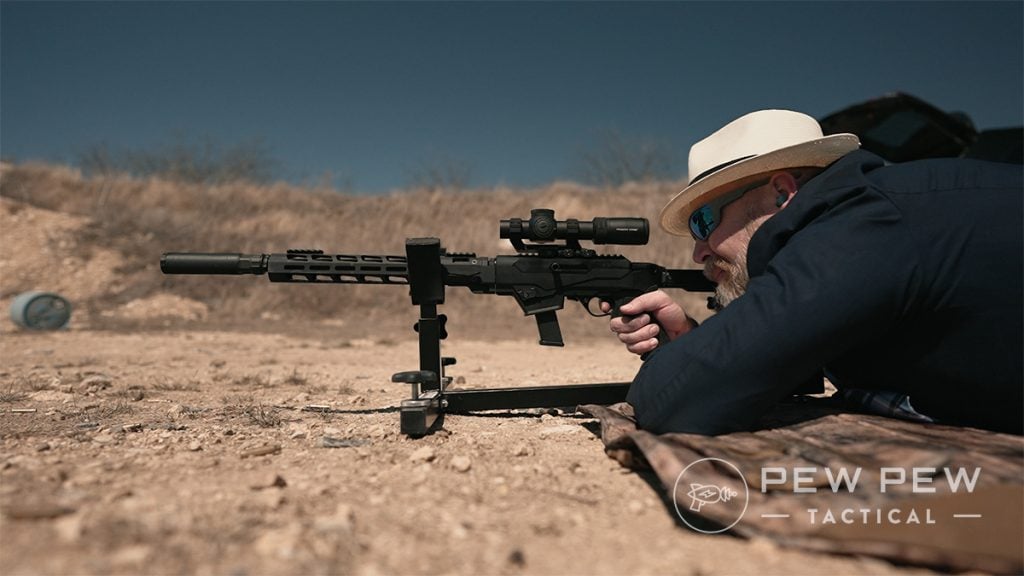
Well, for me, an AR bipod and a bipod for a bolt gun are pretty similar, but there are a few considerations for an AR bipod that make certain ones slightly better than others.
Let’s talk about what makes a good AR-15 bipod and what bipods you should be looking at if you’re interested in shooting with one.
THE QUICK LIST
-
Best Budget Bipod
-
Editor’s Pick
-
Most Adjustable Bipod
-
Best Modular Bipod
-
Best Lightweight Bipod
Table of Contents
Loading…
Why You Should Trust Us
I’ve spent a lifetime shooting, starting with a family that hunted every season they legally could. From there, I joined the United States Marine Corps and spent five years as an infantryman.

In the middle of my Marine Corps career, I began writing and have never stopped. I soon earned my NRA instructor certification and used my knowledge to help guide students.
I love shooting, and I love guns — weird guns, old guns, new guns, tactical guns, you name it. I’m a continual student of firearms, and I strive to educate myself to provide the best information possible to the readers of Pew Pew Tactical.
Best Rifle Bipods
These are generally going to be for brands or particular lines rather than specific bipods because you’ll need to choose the one that meets your particular needs.
1. Harris Engineering Bipods
Prices accurate at time of writing
Prices accurate at time of writing
-
25% off all OAKLEY products - OAKLEY25
Copied! Visit Merchant
Pros
- Affordable
- Lightweight
- Wide availability
Cons
- Not as rugged as other options
Harris bipods are perfect for those on a budget, especially since most ARs aren’t going to put the stress on it that a larger caliber would.
I like the Harris 1A2-LM in particular because of its lightweight and easy-on-the-wallet price tag. If you’re looking to give this bipod thing a try, this is the perfect entry-level bipod in my mind.
They can regularly be found on sale in the $60 range. The pricing is quite good for the quality and very good when you consider that some high-end bipods (that we’ll get to in a minute) can easily hit ten times that price.
2. Atlas Bipods
Prices accurate at time of writing
Prices accurate at time of writing
-
25% off all OAKLEY products - OAKLEY25
Copied! Visit Merchant
Pros
- Durable
- Solid height adjustability system
- Tons of aftermarket feet
Cons
- Slower to deploy than Harris
My preferred flavor of bipod comes from Atlas, and I will fill you in on why.
I’ve dragged mine through dirt, and mud, lost it off the side of a boat for about 15 minutes (no, it wasn’t my fault, yes I was furious), and generally abused it and never had a problem.
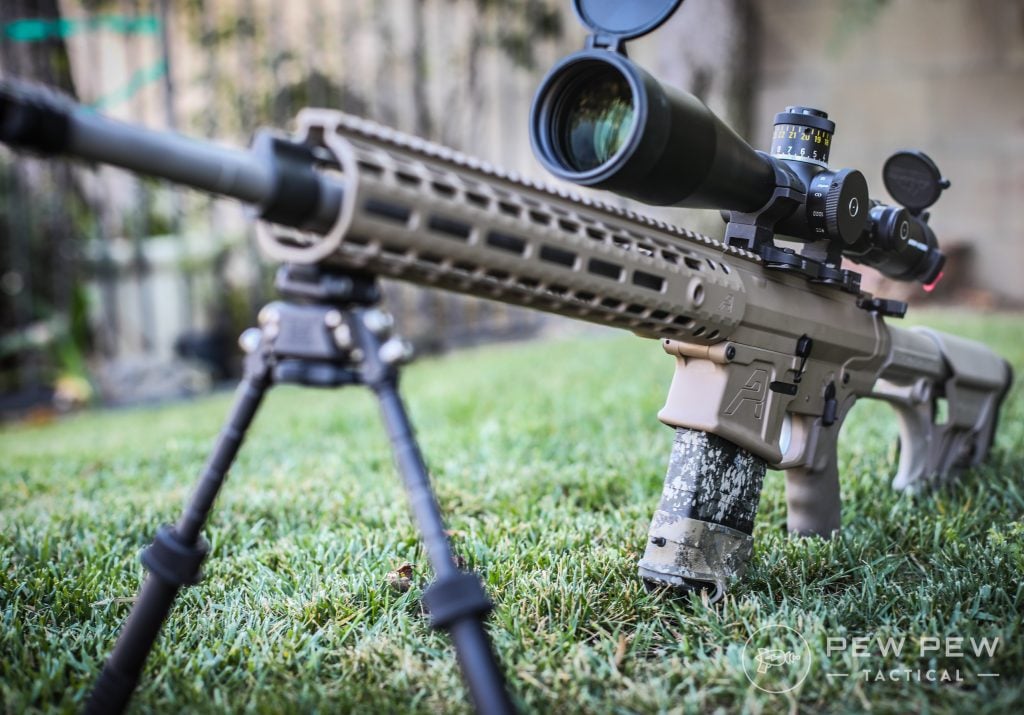
They are north of $200, but that’s actually pretty cheap compared to some of the really high-end bipods out there.
I’ve used this bipod on a .300 Win Mag rifle with no problems. I can comfortably say it’s as bomb-proof as you can get at this price point, and it doesn’t bounce under heavy recoil.
It also has a really solid height adjustment and a wide variety of OEM and aftermarket feet you can easily swap out to suit your personal preference.
What’s your take on the Atlas? Rate it below!
3. GG&G Bipods
Prices accurate at time of writing
Prices accurate at time of writing
-
25% off all OAKLEY products - OAKLEY25
Copied! Visit Merchant
Pros
- Sturdy build quality
- Good adjustment range
Cons
- Non-notched legs can be difficult to adjust when prone
GG&G is another middle-of-the-road bipod option that is also good in this price range. They are also made in the U.S., like Atlas bipods.
I include this one because I’ve heard such good things about it from other serious shooters.
You can get a GG&G bipod for about the same price as a base model Atlas, but when you start looking at higher-end Atlas offerings, the price difference might come into play.
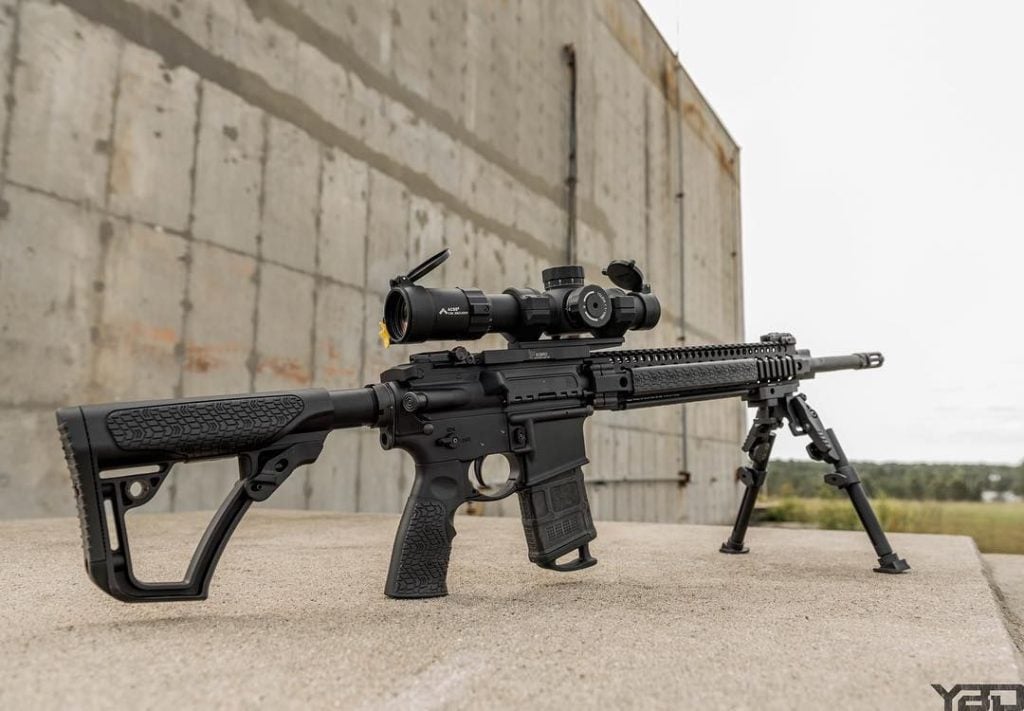
In general, I’d say go for either one, depending on which one is cheaper and how important some of that Atlas line’s extra features are.
4. Elite Iron Rev Lution Bipod
Prices accurate at time of writing
Prices accurate at time of writing
-
25% off all OAKLEY products - OAKLEY25
Copied! Visit Merchant
Pros
- Bomb-proof
- Very stable
- Great for odd angles
Cons
- Extremely expensive
- Heavy
Are you one of those “overkill is underrated” types? Me too.
If you want a bomb-proof bipod that you can also use as a club once you run out of ammo, the Elite Iron Rev Lution is where you should look.
This is the bipod I’d buy if I needed just one to move from rifle to rifle with the confidence that it could handle anything from a .22 LR to .408 (no, that’s not a typo).
Its extended legs can rotate 360 degrees within the mount. This allows you to get away with all manner of angles and configurations.
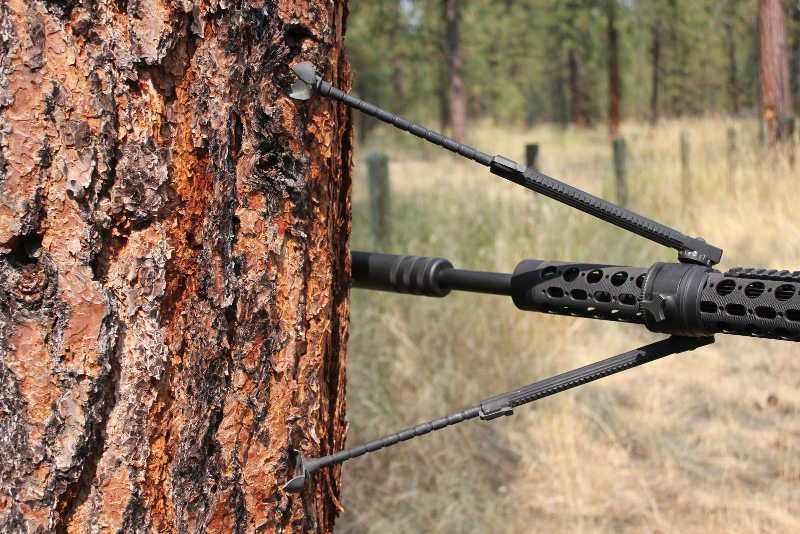
All-steel construction features no exposed springs, and an easy-locking will let you have a rock-steady shooting platform, even at weird angles.
The only downsides are the price ($600+) and the weight at 34 ounces, but if you’re looking for one bipod to do it all, this is the one.
5. MDT CKYE-POD Gen 2 Bipod
Prices accurate at time of writing
Prices accurate at time of writing
-
25% off all OAKLEY products - OAKLEY25
Copied! Visit Merchant
Pros
- Ultra wide adjustment range
- Separate pan and cant tension adjustments
- Rugged
Cons
- Expensive
The MDT CKYE-POD might be the premier bipod on the market. I can’t think of one better than the CKYE-POD if you are a professional shooter who needs a top-tier match bipod.
MDT designed the bipod to be easily adjustable with a single hand to allow positive control over the rifle as the bipod is deployed and put into action.
Adjusting the CKYE-POD’s leg height can be done with a single hand without much challenge. It’s quick, simple, and allows for broad adjustments.
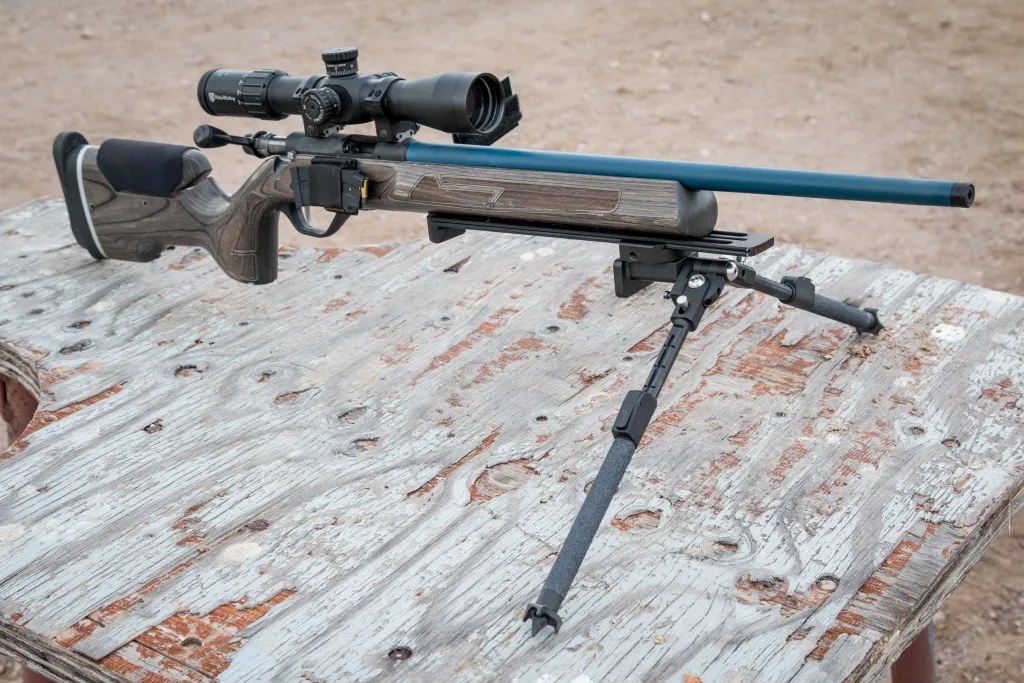
On the standard model, adjustments range from 4.5 inches to fairly tall 15.5 inches. The height of the legs can also be adjusted independently of each other.
With 170 degrees of cant and 360 degrees of pan, your ability to move the rifle from target to target is unparalleled. There is also a pan-free version if you don’t care for the pan feature.
There is a separate tension adjustment for both pan and cant, and you can also swap the feet to best fit your shooting environment.
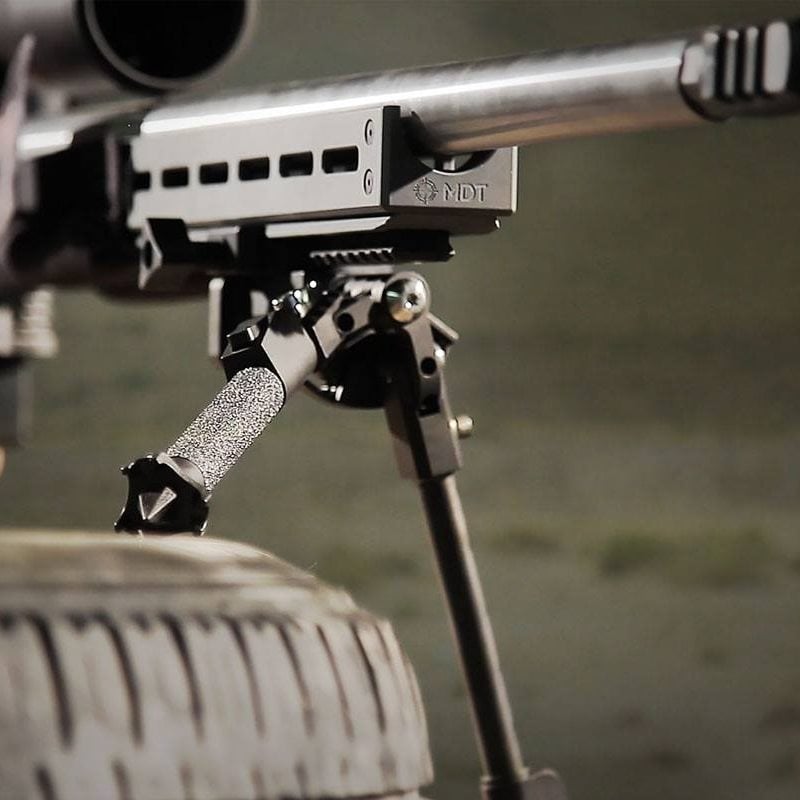
It comes in either left or right-handed designs, so even you wrong-handers can feel at home.
On top of all the fancy features, the CKYE-POD also featured a rugged design. It is made to last and refined with a tumble deburring process for smooth and easy operation.
6. Spartan Precision Equipment Valhalla Rifle Bipod
-
25% off all OAKLEY products - OAKLEY25
Copied! Visit Merchant
Pros
- Great mounting system
- Good feet design
- Easy to adjust with one hand
Cons
- Non-notched legs may be a turn-off for some
This lightweight, high-tech bipod is designed with input for Norwegian special operations, earning it the Valhalla namesake.
It uses a rather ingenious and unique attachment system. You attach an included adapter, be it M-LOK or Picatinny, and then attach the bipod to the adapter.
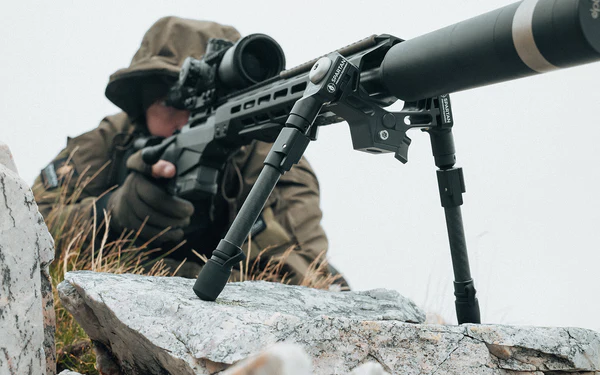
This allows you to quickly remove and attach the bipod on the fly. Bipods are great when you need them, but when you don’t, they are boat anchors that unbalance your rifle.
After you remove the bipod, you are left with an adapter that weighs a few ounces at most. This makes it much easier to handle or store your rifle.
The Valhalla features 7075 construction with a hard-anodized finish. The feet feature tungsten carbide tips with textured synthetic slip-on ‘boots’ to accommodate multiple environments.
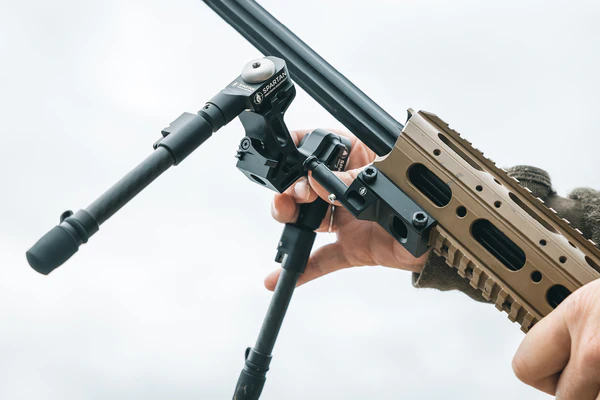
Spartan Precision designed the legs to be easily adjustable with a single hand, and they are spring-loaded for rapid deployment.
It’s a bipod designed for hunting, competition, and tactical shooting. It’s one of the most modular bipod platforms on the planet. If you prefer that flexibility, this is the route to take.
7. Magpul Bipod
Prices accurate at time of writing
Prices accurate at time of writing
-
25% off all OAKLEY products - OAKLEY25
Copied! Visit Merchant
Pros
- Affordable
- Lightweight
- Various mounting options
Cons
- Feet aren't the best
Magpul does a great job of delivering a product, and they did so again with their newly released bipods. These are half polymer and half Aluminum, meaning they are robust and lightweight.
Available in M-LOK, A.R.M.S. 17S, and Picatinny rail mounting options and in both Black and FDE colors — it’s fairly easy to find the right one for your rifle and tastes.
Adjustability between 6.3 and 10.3 inches gives most people the height options they need without adding undue weight to the system.
Weighing in at only 11 ounces also puts it at a fairly low weight comparatively, making it easy to hike and move with.
The feet aren’t our favorite we’ve used, but they do a good enough job on most surfaces and are durable even on ragged rock.
Plus, it’s got a nice, clean look to it.
8. Accu-Tac FD-4 Arca Spec QD
Pros
- Extensions retract with a button
- Durable
- 45 degree setting
Cons
- Expensive
The FD-4 Arca Spec QD bipod is definitely on the higher end of the quality scale. Made from Type III hard anodized aircraft aluminum and steel hardware, this unit is rugged.
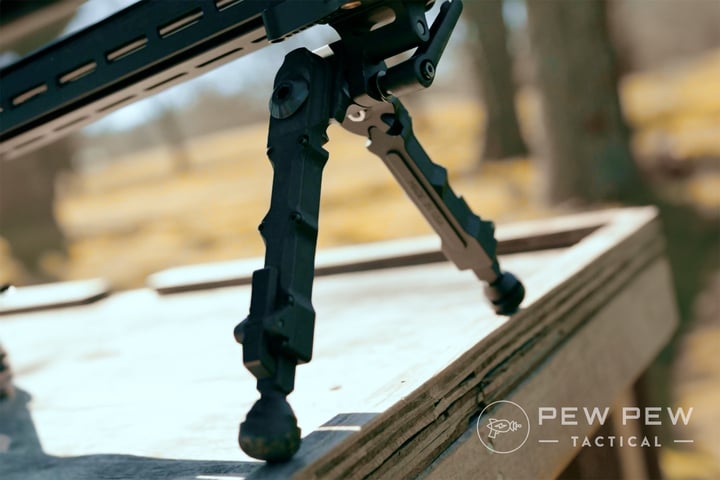
In addition to tough, the FD-4 is diverse and can quickly change between stowed, 45 and 90 degrees. Each leg is independent, creating a wider array of options for shooters.
One of the coolest features of this bipod concerns the elevation extensions. Although there are 5 notches for additional height, you can compress the legs again simply by pushing a button.
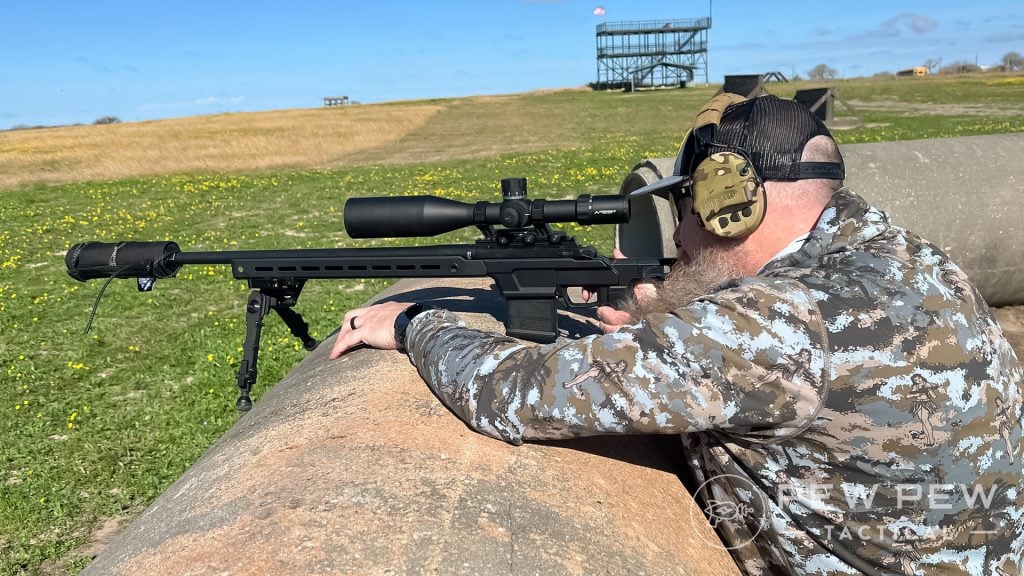
The FD-4 also includes a cant feature that can be locked or unlocked using a large lever. The feet are also customizable with a wide range of options: anything from skiis, spikes, claws and sleds are available.
Finally, Accu-Tac makes their bipods in America and carry a limited lifetime warranty.
Why Do You Need a Bipod?
Shooting off bags or with a ransom rest is great and all, but good luck hauling those around if you’re hunting, participating in action shooting sports, or, worse, actual combat.
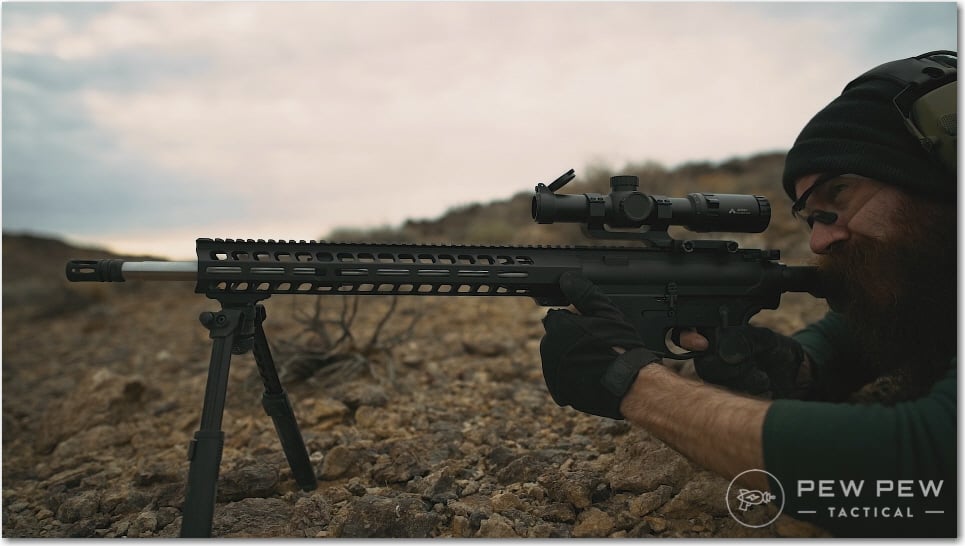
A bipod, when appropriately used, gives you a lot more stability than trying to shoot free-hand, and it attaches directly to your rifle, so you don’t have anything else to lug around — though it does add some weight to the front end.
What Makes a Good Bipod?
Let’s talk about some of the considerations when choosing a bipod for your AR-15.
Find Something that Matches Your Caliber
Like a lot of things, the best bipod for you depends on your application. If you’re shooting a big .50 cal, you’re going to need something extremely robust and sturdy.
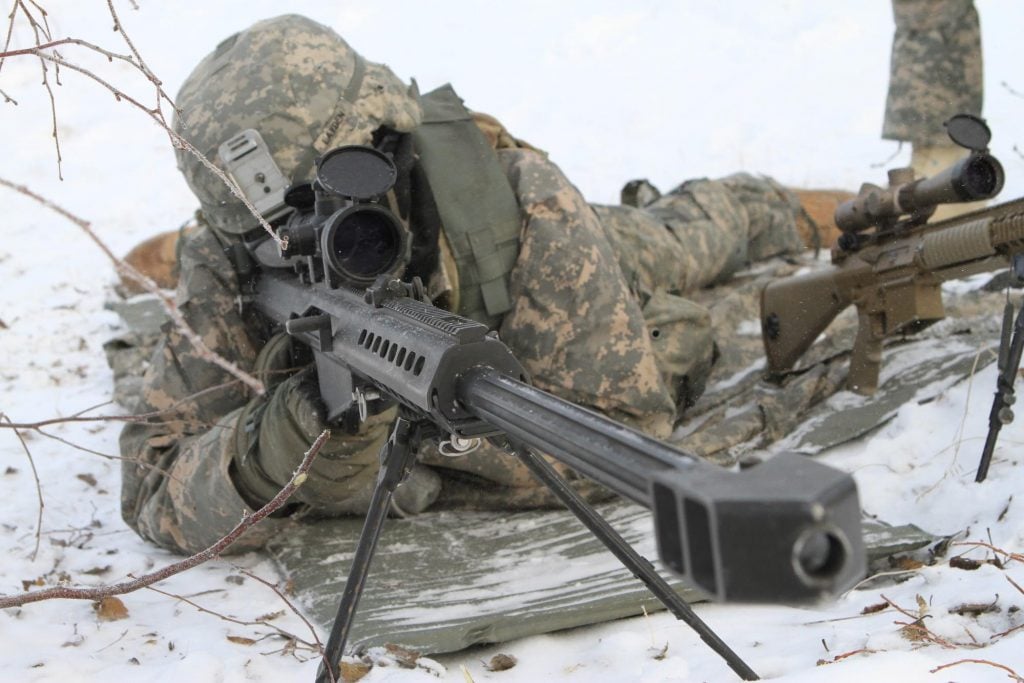
If you’re shooting a lightweight .22 target rifle, you still need something that will give you a stable shooting platform, but you can get by with something a little less robust.
Most AR-15s are fairly light in the recoil department, and you’re likely to be moving around with it unless you’re just doing some target shooting at the range, so you are best with something lighter if you can get it.
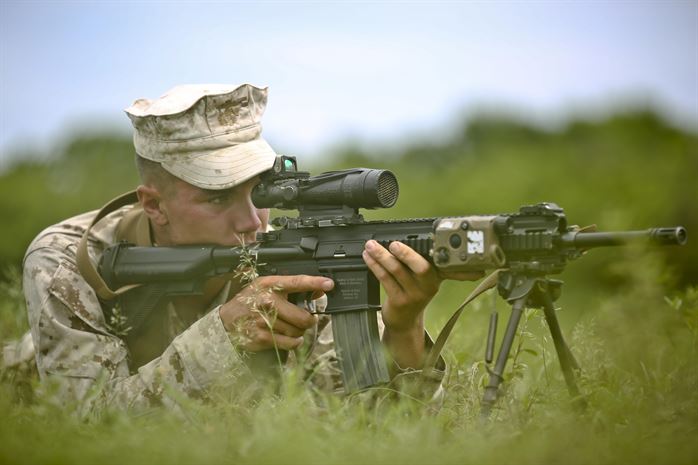
As with most things, you get what you pay for, so if you think you can get by with a $50 airsoft bipod on your expensive precision rifle, you are sadly mistaken.
This segues nicely into the next big consideration…
Durability of the Bipod
Your bipod is going to undergo a lot of stress between the recoil and supporting the forward load you put on it to control said recoil.
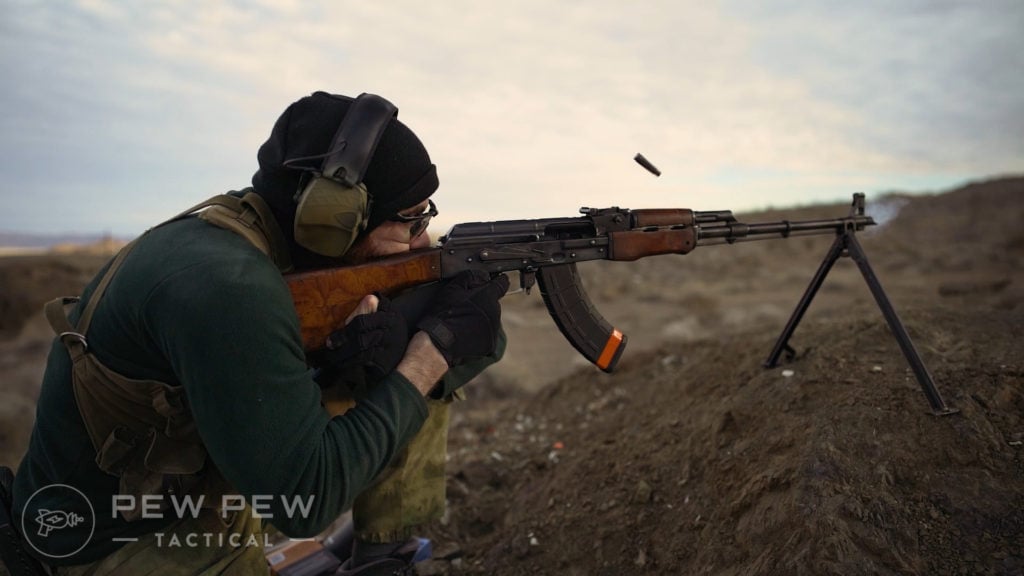
Because of these stresses, we want a bipod that is going to stand up to repeated use and abuse. Now, if you’re looking for a rifle you shoot twice a year, you can skimp a little here. If you’re looking to hunt or compete with your bipod or plan on target shooting a lot, buy once, cry once.
Go with a nicer one. It’ll save you money in the long run when your cheapo knockoff doesn’t lock in place anymore.
Height of the Bipod
Height is another thing you need to choose based on your specific circumstances.
For one thing, the bipod needs to be able to reach a height that is comfortable and appropriate for the shooter. It’s absolutely possible for a bipod to be too low.
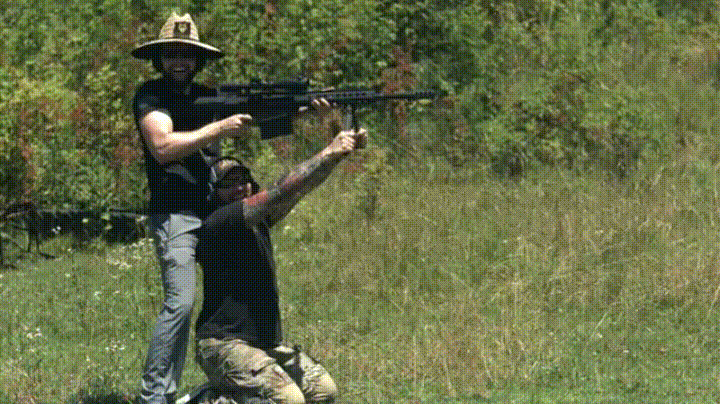
Most bipods have legs that adjust from 6 to 9 inches, which is a pretty standard height, but I personally like legs that go up to at least 15 inches to accommodate a broader range of shooting positions and angles.
Other Features
Some other little quality-of-life things are worth considering as well.
Bipod Feet
Are you mostly shooting on hard-packed dirt in the desert, or are you hunting over mostly soft-ish ground? Are you shooting off barricades and obstacles? Maybe you’re using the side of your deer stand or a tree limb.
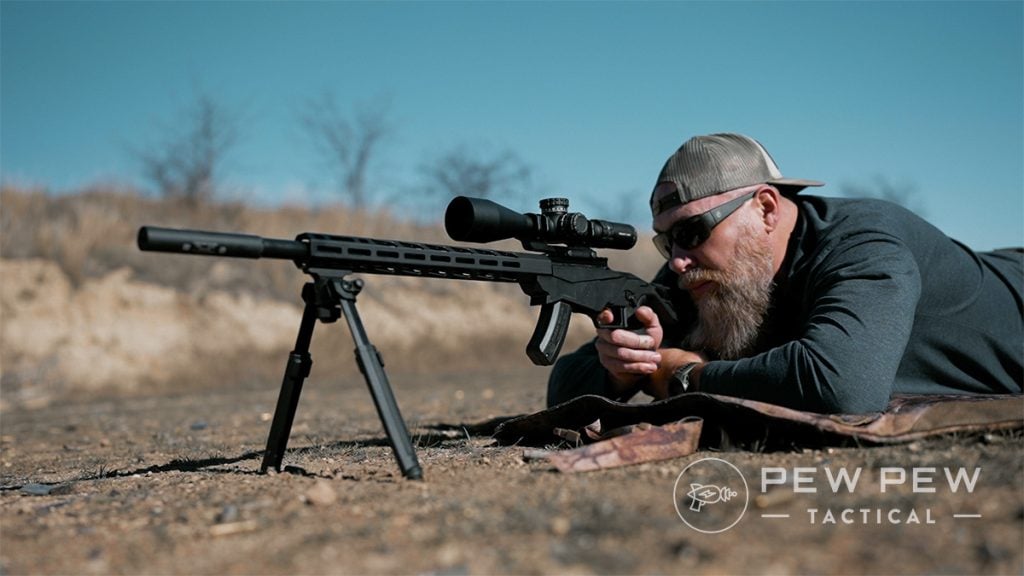
There are specialized feet that excel on all these different terrain types and in these situations. I like a bipod with interchangeable feet so I can have whatever I need when I need it. But in general, I’d say go with a more aggressive foot than you think you’ll need.
Soft surfaces are stable surfaces, and hard-packed turf can cause your rifle to bounce more under recoil, which can make your follow-through and follow-up shots more difficult.
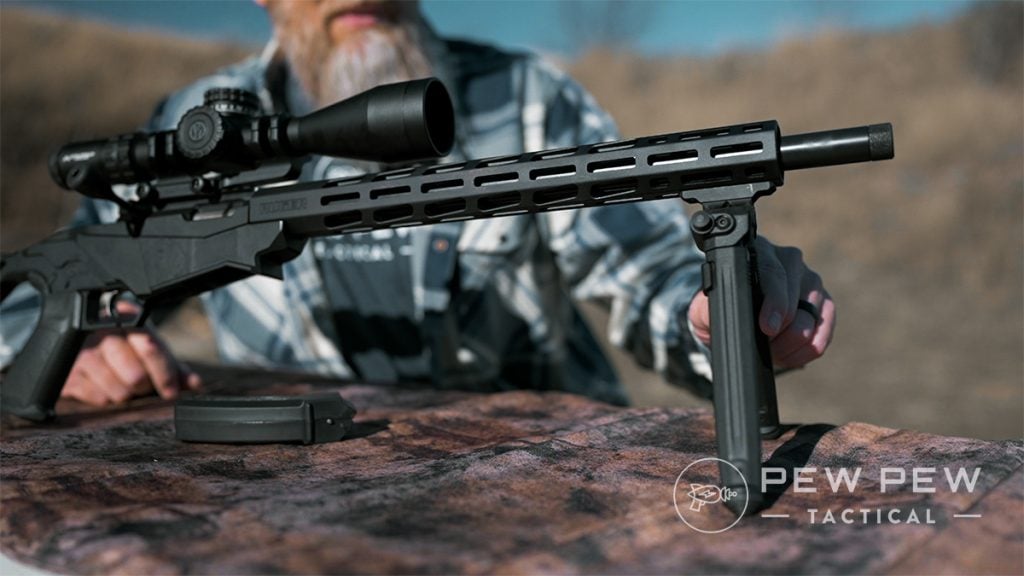
In general, your sights should stay on target through the recoil impulse. If you find your crosshairs way off after a shot, there’s a chance your bipod isn’t gripping and is bouncing off the surface.
This is why we push forward to “load” the bipod, which is made easier with a more aggressive foot that grips the ground or other surfaces better than a smooth rubber one.
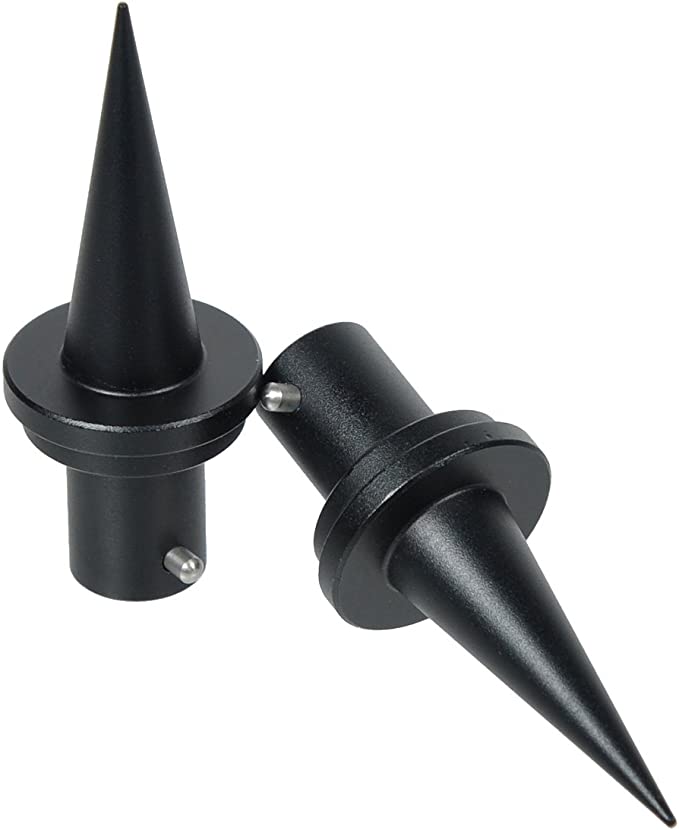
Notched Legs
This isn’t strictly necessary, but notched or otherwise marked legs that let you get a really precise level are nice. These are also nice if you regularly shoot from the same bench and want to have a consistent height.
Pan and Tilt
A bipod that can pan left and right and tilt up and down is great for folks who may need to track a moving target or cover a large area.
However, they aren’t always needed. If you are just doing target shooting or something like 3-Gun, you are generally going to be only shooting in one direction for safety purposes.
Attachment Method
Many bipods come ready to attach to the forward sling swivel on a bolt gun, which is something most ARs don’t have. So make sure either you get one that works with your handguard, or you get an adapter that has a sling swivel for the other style.
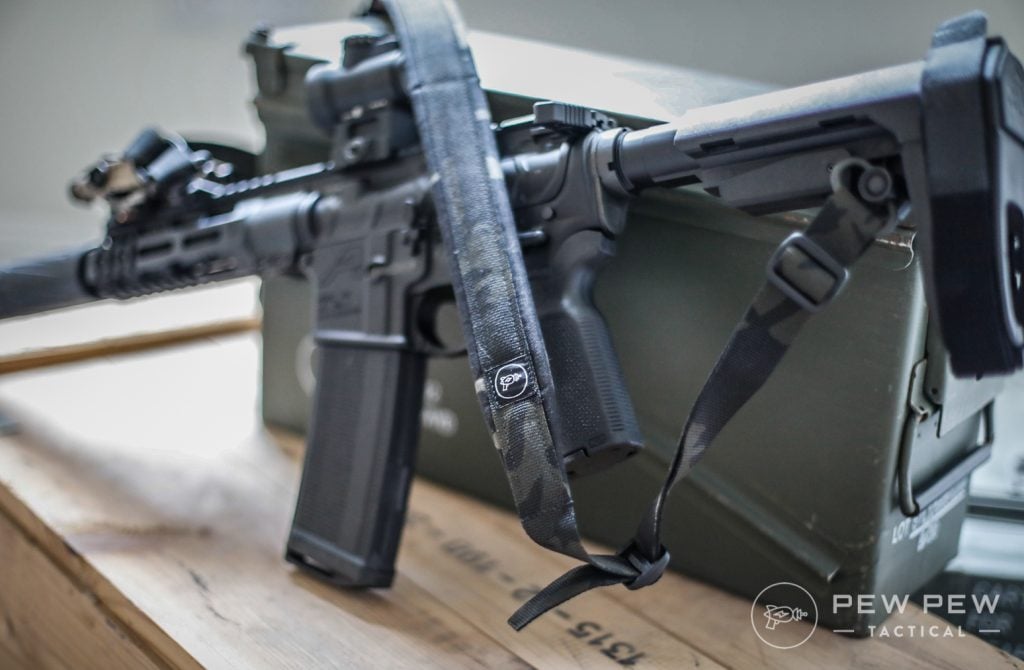
Generally, a Picatinny mount with a QD lever is the way to go.
FAQs
What does a bipod do?
It helps support and steady your rifle, providing more stability when can increase accuracy.
Is a bipod necessary?
Depends on what your activity is. For range shooting at closer ranges, probably not. Long range, precision shooting or some hunts, yes.
Where do you mount a bipod?
Bipods are mounted to the rifle's rails.
Final Thoughts
There are a lot of great AR-15 bipod options out there. Hopefully, this has given you some ideas about what makes a good bipod, how to choose, and some good places to start your search.
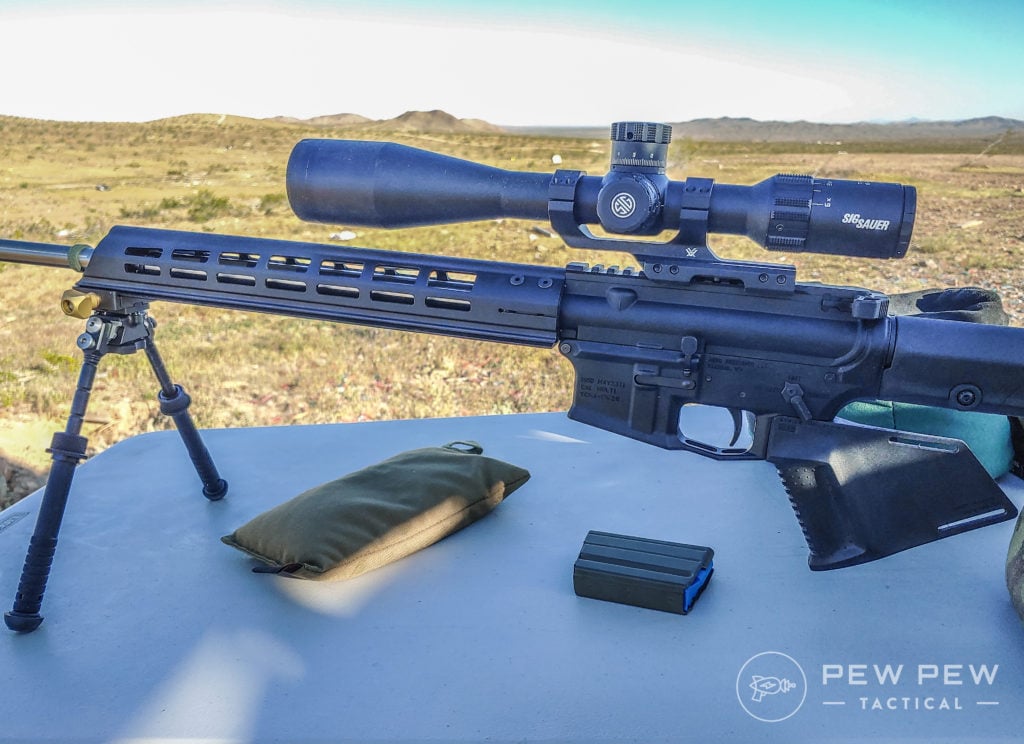
What do you think of these bipods? Do you have a favorite? Be sure to let us know in the comments below! Going to be shooting prone often? Check out our article on the 5 Best Shooting Mats!

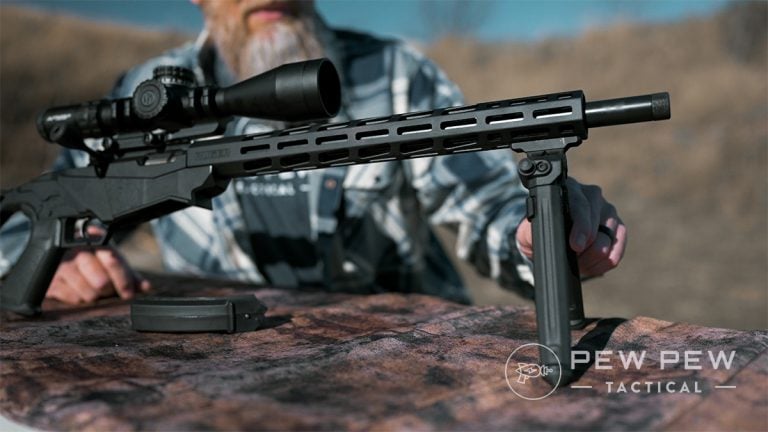
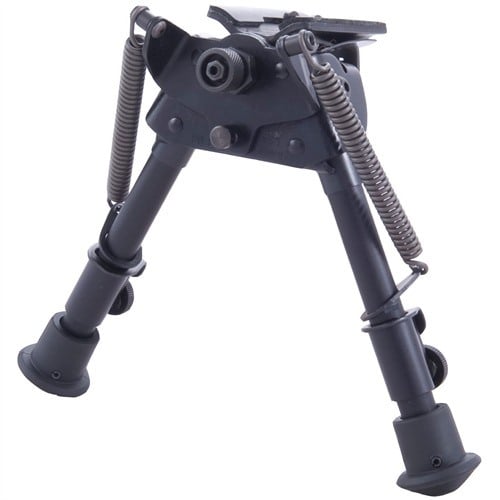
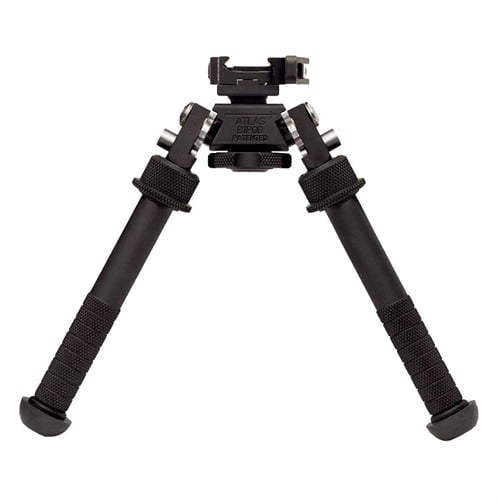
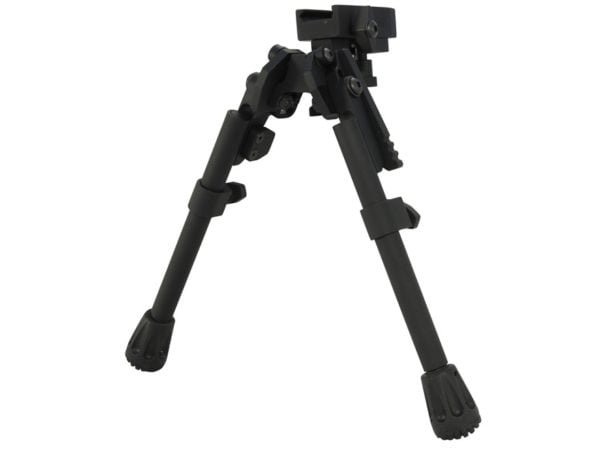
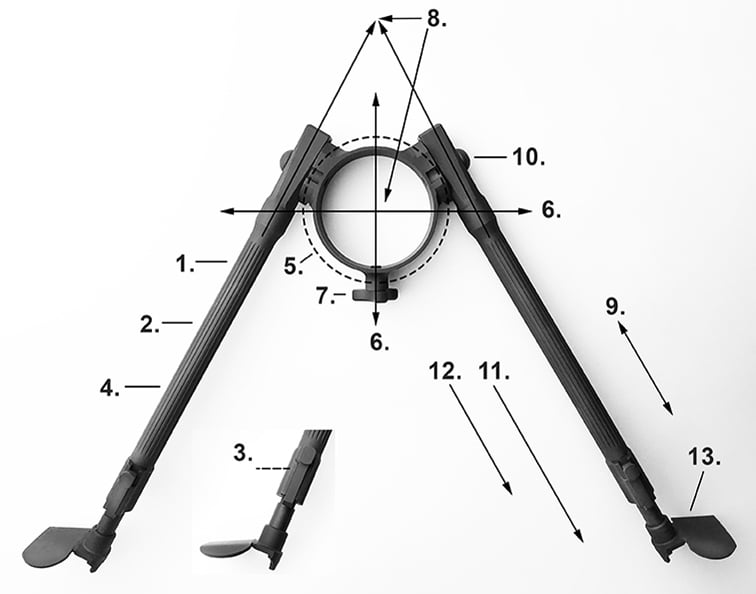
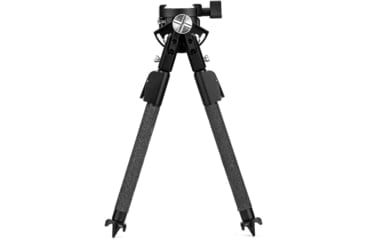
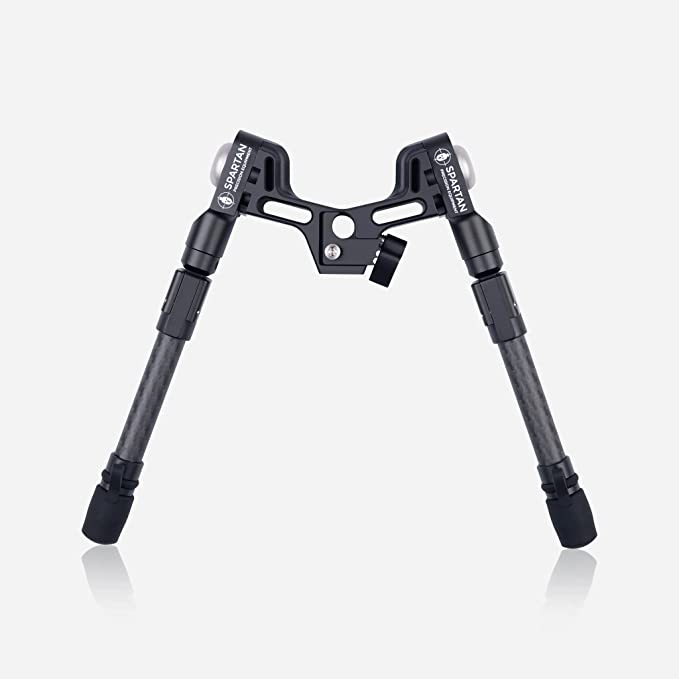
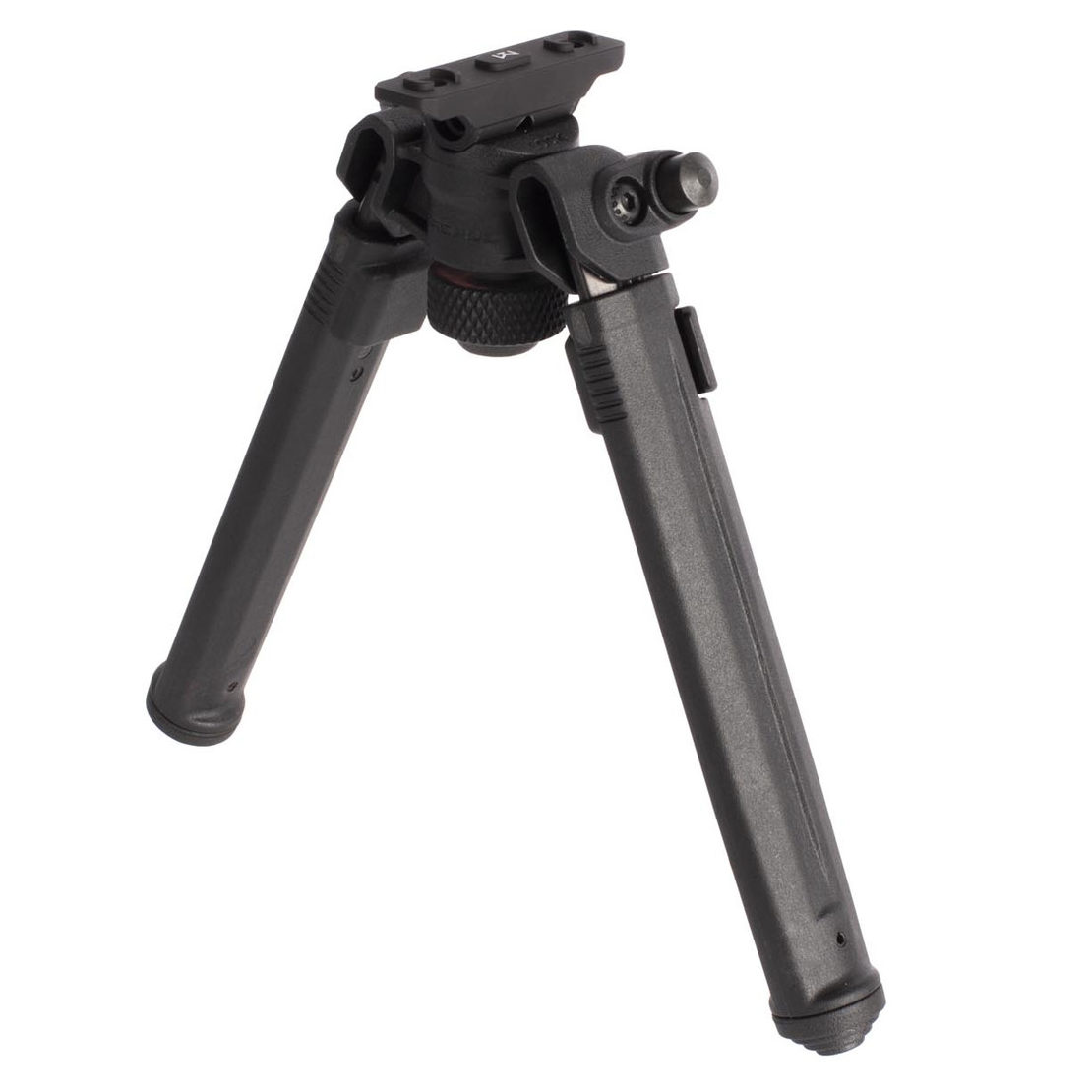







29 Leave a Reply
Mr. Collins,
I , just want to say thank you !
First taking the time and doing the research on all these products with an exceptional range of details to each item and giving us the amount on knowledge we need to make a decision when trying to figure out which item we want to fit out needs and criteria of options and price.
Please ! keep the exceptional work going !
Your new loyal read .
Sincerely. The Dad of 3 on a Cheep budget
Needing quality at every corner !
Brad o.
@Matthew. Of the feet upgrades that the Magpul are compatible with which ones are your favorite?
I thought it could take Atlas or Harris or both?
I have the Warne Precision Bipod Pic Rail Interface. Surprised you didn't mention them.
I'm curious as well.
The local Sportsman's carry the Warne 7901M ($299.99) with good reviews.
I have an Atlas. Thanks for listing the others. I don’t feel like such an idiot for spending as much as I did. Mine has the LaRue qd. I bought it for/because of the light weight (and easy on/easy off). I absolutely love everything about it, except the price (but not so much anymore). I beat the crap out of it, throwing it to barrels and such. It has never failed. It’s so light you hardly know it’s there.
I have the VERSA POD RUBBER FEET SLING SWIVEL MOUNT 9-12" on two of my long range rifles, sturdy and reliable bipods.
If you have the traditional A2 Sight, you can have the bottom of the sight drilled and tapped to accept a short picatinny rail for a mounting point, though this will not only effect POI, but can interfere with the barrels harmonics. It may also be possible for a gunsmith to mount a section on your handguard or a Harris HB5 Sling Swivel that was intended for mounting on polymer handguards. Harris makes a bipod model that is a direct fit to the HB5 swivel. There used to be a bipod called the XM3, that fit around the barrel in a non permanent scissor action. I don't know if it's still made, as it was introduced during the Vietnam War. Occassionally, you can find one on eBay for around $150. They were not adjustable for height. If you're going retro/period appropriate, that would be the original M16 Bipod of the 60's/early 70's. They were made out of an early nylon polymer.
Please note that all methods directly and/or indirectly mounts to/effects your barrel. Of those three options, the second is less direct although the weight of the barrel is still resting on points in the handguard. In casual shooting, you may not notice much POI drift, but in longer and precision sessions you will notice a POI change.
One of the main reasons why they moved away from the traditional handguard to free float handguards began when accessories became the wave of the future as each accessory added effected POI with the barrel. This is why higher end hunting, sniper and precision rifles all employ a Free Float Barrel, in which the stock does not directly touch the barrel. Only the action is bedded to the stock. It took a few years for that idea to begin to be applied to military/police rifles and carbines, and then to civilian models.
Good luck in your search for a serviceable option.
The Free Float Barrel is nothing new to precision shooting - even for the military. For AR style firearms it may be, but for virtually all the precision wood stocked rifles I encountered (Viet Nam) any of them worth a darn were free floated. I have a "custom made special purpose rifle" built on a 03 action that still functions well - and has ever since it's completion in the late sixties. It has a Harris bi pod and I am thinking about replacing it, just as I replaced the Weaver 10x AO scope a few years ago with something more modern (and costing more than the cost of the rifle!). Gotta keep up with good technology! Still have not found a reason to change it from '06 tho. (having a good stock of well matched, specifically loaded for the rifle rounds has something to do with that!)
I really do appreciate your evaluation of the various bi pods. This has given me a good place to start shopping! Thanks!
Free floats were an institutional answer so the M4 could accept any of the almost 100 accessories purchased for specific jobs each MOS had to perform with that rifle. SOPMOD became a thing where 48" of rail space offered all the potential for mounting those accessories needed.
That led to the M4gery becoming popular in the early 2000's and credit card commandos loading them up with all the rarest accessories in forum pics to see who measured up. That phenomenon was also the first indication of how 70% of young men were not being raised with a father at home.
Most of the free float community at the time were a few special long distance shooters and the Service Rifle competitors who installed them under military handguards. The benefits were there - for those with precision barrels with less than 1MOA accuracy (in writing) and the entire point of those rifles was a lack of accessories for a combat role. The milspec M4 is a 2MOA carbine being used effectively to 125 meters - because the enemy has the annoying habit of hiding behind cover and not appearing long enough to be a target until they get that close.
Freefloats became a must have accessory even tho many owners rarely shot further than 100m on the local range. And a lot were installed on carbines with 2MOA commodity barrels - which doesn't make them a precision firearm at all. A scope would deliver more accuracy and the Army went that direction once the improvement was documented - but only on accurized rifles with subMOA barrels.
Bit of a moot point since a 2MOA rifle will still hit a 10" circle at 500m - and the average center of mass of either a large game animal or enemy target is 18". Having a 1MOA barrel would allow almost 18 MOA of error - the idea we all need to be snipers isn't justified in DOD because of the immense training cost to keep up a perishable skill. It takes 10,000 rounds a year to develop and maintain that skill, weeks at the range to keep it - in all weather - and would mean shooting about 1,000 qualifications worth of ammo annually.
I'm currently building a dissipator with a railed gas block holding standard clip in handguards and will install it inverted to mount a bipod. Sighting in on a bench and using the rifle in the field deer hunting will be effectively accurate without the extra $100 expense of an free float that isn't justified - the barrel isn't an precision accuracy sharpshooter. If I wanted that, a $400 barrel would have been the first choice, and a 12x variable scope good money spent. The bipod while a good accessory is pretty far down the list when expedient bags, limbs, car hoods, etc filled the role the previous 75 years.
Of late there's a lot of measuring going on over them, I suspect its now the credit card commandos latest focus on owning something few others could afford.
As you say, though I have a bipod, I don't have it mounted (though it will with the QR mount on it).
90% of my shooting is within a 100 yards, so keeping the bipod on just adds extra weight. 0Occasionally, I'll put it on as well as the 4-12 × 44 Vortex scope and plink away at the 300 and 500 yard targets, just to keep from getting too rusty.
I want to hear about the Swagger bipods. Every one I know that has one usually has more than one, and they swear by them.
Is there a bi-pod that can attach to my barrel I have a S & W M & P 15 rifle, with a plastic (Viet Nam Style) rail guard. I do not want to change this. Please help!
I dont know of one and I strongly recommend NOT attaching anything directly to the barrel. It will shift your POI every time you use it and will ruin accuracy.
Some of the SW MP 15's come with the Magpul M-Lok hand guard. I have both styles. You can change out the handguard in 5 minutes and switch back when the bipod isn't needed. $35 or so. An easy fix.
Hi, I was interested in the magpul for my DDM4V7,, On a site, Magpul answered: it would not work with my DDM4, and picatinny rails? But you say here works with picatinny rails. I just like the fact magpul does not employ springs,. I haven't shot much in many years,. But I did just purchase the Spitfire ACOG,. Looking forward to sighting it in soon, when I finally have some time off,, Thx. TheStig :)
The marine in that picture is using the M27 IAR, not an AR15
As an armorer, thank you for this.
Attempting to find information on the BLK LBL integrated handguard / bipod. Have you had the opportunity to come across them or plans to review?
We actually are looking to review it, I believe it's on the way or will be soon. I'm excited about it also!
Any update on a review of the BLK LBL?
It fell through last year and we haven't had the chance to get it in hand since. I'll add it to my list though and see if we can make something happen, thanks for the reminder!
What are you trying to say in the paragraph just below the last picture? Easy locking what? Am I going to have a rock steady shooting platform or not? Thanks.
What is your opinion of Magpul’s bipod?
Any comment or reviews for the accu-tac line of bipods?
I have several Accu-Tac bipods & several Atlas. I really like both, but the Accu-Tac's are built like no other. Very heavy duty & will take a beating.
I have an Alexander Arms. 50 Beowulf, I'm looking for a durable bipod. Price isn't terribly important, I want something quality that will last with the amount of recoil my weapon has. Any suggestions would be appreciated.
Scarce are reviews on the Accu-Tac line. Interesting to me was the SR-5 QD with spike feet, so much so I ordered them. The few reviews available ranked this model well. Previously, I tried the under $25 bipod and the $100+ caa tactical. which was a mistake. The caa may be suitable for tactical but is extremely loose for precision unless pre-loaded and additionally loaded with 50 lb.s of sandbags. Hopefully, the Accu-Tac will address my requirement for precision. use. (AR-15 and Ar-10 Rifles)
You’re missing one of the best out the Modular Evolution bipod. Quick swap legs, quick swap feet, carbon fiber construction and does forward and back angles as well as store flat. It’s awesome.
Looks interesting! We'll have to look closer at it soon.